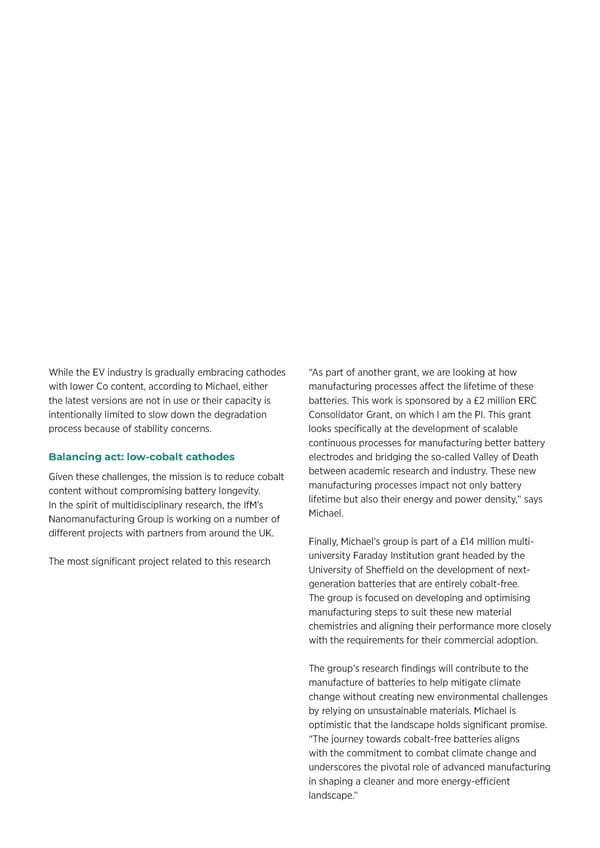SUSTAINABILITY SPOTLIGHT | 23 While the EV industry is gradually embracing cathodes “As part of another grant, we are looking at how with lower Co content, according to Michael, either manufacturing processes a昀昀ect the lifetime of these the latest versions are not in use or their capacity is batteries. This work is sponsored by a £2 million ERC intentionally limited to slow down the degradation Consolidator Grant, on which I am the PI. This grant process because of stability concerns. looks speci昀椀cally at the development of scalable continuous processes for manufacturing better battery Balancing act: low-cobalt cathodes electrodes and bridging the so-called Valley of Death Given these challenges, the mission is to reduce cobalt between academic research and industry. These new content without compromising battery longevity. manufacturing processes impact not only battery In the spirit of multidisciplinary research, the IfM’s lifetime but also their energy and power density,” says Nanomanufacturing Group is working on a number of Michael. di昀昀erent projects with partners from around the UK. Finally, Michael’s group is part of a £14 million multi- The most signi昀椀cant project related to this research university Faraday Institution grant headed by the topic is a multi-university £22 million grant from the University of She昀케eld on the development of next- Faraday Institution, headed by Professor Clare Grey generation batteries that are entirely cobalt-free. in the Department of Chemistry. Michael leads one The group is focused on developing and optimising of the three project work packages, working with manufacturing steps to suit these new material colleagues from the University of Warwick, Imperial chemistries and aligning their performance more closely College London, Newcastle University, University with the requirements for their commercial adoption. College London, the University of Birmingham, the The group’s research 昀椀ndings will contribute to the University of Oxford, the University of She昀케eld and manufacture of batteries to help mitigate climate the University of Southampton. He explains: “We are change without creating new environmental challenges looking at degradation processes that are a result of by relying on unsustainable materials. Michael is incompatibilities between classic electrolytes and new optimistic that the landscape holds signi昀椀cant promise. cathodes with very low cobalt content. The team is “The journey towards cobalt-free batteries aligns looking at developing better cathodes and the anodes with the commitment to combat climate change and of batteries. underscores the pivotal role of advanced manufacturing in shaping a cleaner and more energy-e昀케cient landscape.”
 Sustainability Spotlight Magazine Page 22 Page 24
Sustainability Spotlight Magazine Page 22 Page 24